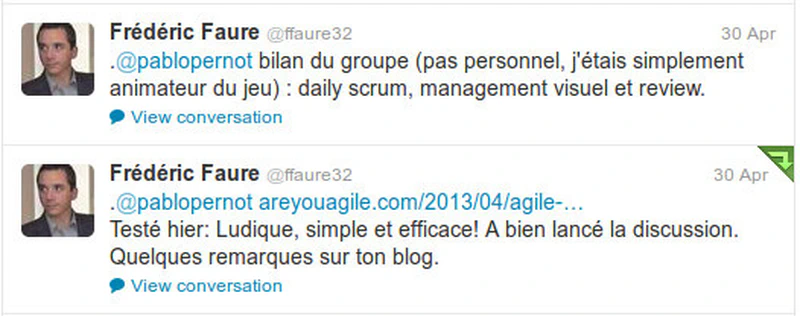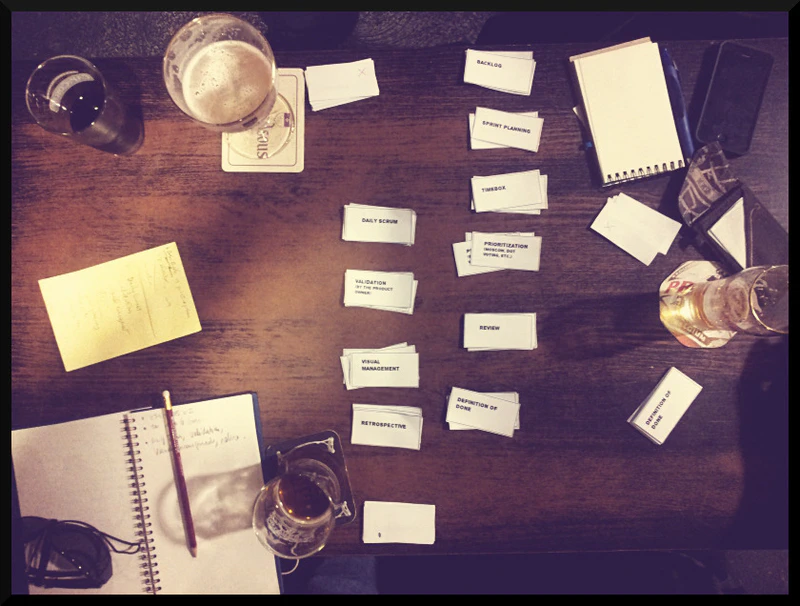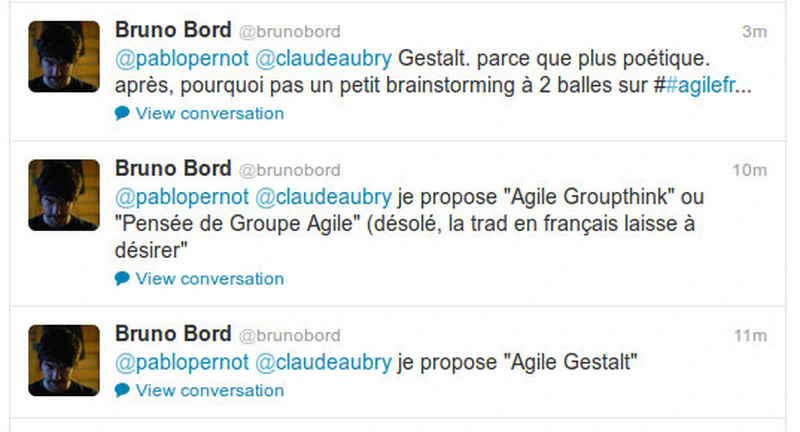[ The new and latest version of the game is called “The Practice Sawmill” and can be found here ]
Here’s some initial feedback on this agile game attempt Agile DNA. Following the publication of this first article I received quite a bit of feedback. Thanks to everyone, I’ll quickly summarize it here, and also give feedback from a first long game last night at “Baraka Jeux” in Montpellier. Naturally a new version of the game is delivered on the spot, let’s say the May 1st version (a game on that day is good) stamped “Baraka Jeux”.
Feedback from the agile games group
So first quite a bit of feedback on the discussion group agile games france, from Pierre, Alfred or Jacques. Thanks to you all. What I’m taking away for now (the game needs to be tested to have a real opinion):
- Lots of proposed sources for the practices. The practices proposed are those that seemed most obvious to me. Naturally the cards will evolve as the practices themselves evolve. 36 is a good number (I can better confirm this since yesterday, 36 seems like a good starting number to me).
- Managing families. An idea to develop that I’m not grasping for now. Because classifying practices by family already induces a … classification. Yet I clearly saw yesterday (as at Agile Open Sud) that there were many variations in our understandings of practices, especially depending on context (I’ll come back to this). Making families remains arbitrary and I don’t wish to integrate that for now. But feel free to fork.
- The idea of using the game in retrospective or in training is mentioned. Good ideas. If anyone has feedback I’m interested.
In short, I’m summarizing very quickly and I encourage you to join the discussion group to talk about agile games in France.
feedback from Frédéric

My comments on your new game: A super simple game to set up and really useful for opening discussion. A few remarks:
- cutting out and sorting the cards is a bit laborious but oh well, that’s part of the game ;) - There were 5 voters and the 1st vote only brought out 3 practices. Those present were probably heterogeneous. We broadened the selection mode by keeping those that had 4 votes out of 5. We ended up with 8 practices, a good number in my opinion, for discussion. We grouped them into 3 broad families (daily, backlog and visual management) and we discussed to keep one element from each family. - Warning, “Estimates” appears 2x and for me, “impediment backlog” is missing as a practice.
My response
First thanks, and yes there’s a small bug: two “estimates” cards, I’m correcting by adding: “Agile Game” and I’m removing the subtitle “elevator pitch” which limits “vision” too much. Then yesterday we were 4 and we agreed on 4 practices (unanimity), and 10 with 3 votes out of 4. This already seems like an instructive indication: our two groups are perhaps not really aligned. In fact with us one person in particular had a different approach, and we were able to quickly observe it, thus potentially realign everyone (or not for that matter). We decided to launch into a discussion on the 10 practices common to 3/4. We perhaps should have focused on the 4 that emerged but well, I’ll come back to this below. Yes it’s a group assessment that is not personal. It’s the group’s assessment in this context. I’ll come back to this below too. thanks anyway. Finally, I confirm cutting out the cards is sh**ty. And I’m going to add very soon a small glyph on the games to quickly reclassify them…

Evening feedback
First just a description: Stéphane, Vincent & Bertrand gave me the pleasure of coming to test. Relaxation space, beers, cards, good atmosphere, and we launch. 4 practices appear common in the first “round”: Retrospective, Validation (by the PO), Visual Management, Daily Meeting/Scrum. We expand to practices selected by 3 of the 4 participants, we add: Backlog, Sprint Planning, Timebox, Prioritization, Review, Definition of done. After a good hour of discussions (interspersed with various topics), we arrive at Retrospective, Sprint Planning, Validation (by the PO). That’s our assessment, this day, this place, this hour, these people, this context.
I’m going to synthesize my feedback, a thousand things to say otherwise.
Context is essential
Context is essential, we realized yesterday after 20mn that the discussion and choices changed completely depending on what context we projected ourselves into. it is therefore essential to specify the context before the discussion begins and obviously opinions change depending on context.
I propose in the new version a series of “typical” contexts, but you are naturally free to propose your own at the start of the game, but that’s essential. Between approaching these practices as implementing a philosophy of life, or on the contrary projecting oneself into the context of a company that doesn’t master agile culture well and is seeking to transform itself the choices, priorities, analyses of these practices will be different. This gap is moreover very significant.
Detecting whether a group is aligned or not
Among us there was someone a bit different (in all the good senses of the term). And so instead of naturally having 7 or 8 common practices, we only had 4. That’s an indication that pleases me. It allows detecting groups not necessarily aligned (it’s not a drama but it’s better -forming, storming, norming, performing, from Tuckman-), and it de facto highlights that the larger a group is the harder it will be to align it. We already knew that? ok. This just confirms and it’s interesting to perceive it in a discussion about practices.
For the rest we decided to integrate practices with 3 votes out of 4. We perhaps should have stayed with the 4 common ones with an even shorter and more intense discussion (I again really loved yesterday’s discussions -as at Agile Open Sud-: surface or deep practices? practices requiring trust or not, what’s really retrospective, what’s the act of validating, etc etc.)
“Decider”, “Sociocracy”, “Benevolent conversations”, etc.
Also interesting yesterday to have tried a very very light version of decider by Jim McCarthy, and a more in-depth version with Stéphane’s (@langlois_s) advice on sociocracy. This phase of necessary agreement in the middle of fierce discussions sets up useful tools. I think it’s probably the most “in development” part (if development there is) of this game. Stéphane, could you write us a little post about it? (that I’ll publish here if you wish, and in the game?). These tools must serve to prevent us from digging in too much during discussions.
Practices not principles
No, naturally these are not principle or value cards, but indeed practice cards. Yes that’s the whole point. On one hand it’s precisely the game’s purpose to discover all the value or principles, i.e. the culture, behind practices, the game brings what I strive to try to do during my missions. On the other hand tackling a discussion about values or principles is stifling. No one is going to make concessions on values or principles, whereas on practices…
Feedback on the name
Someone sends me a message that I’ll summarize: this name sucks. A certain population complains about it, it reminds them of the crappy marketing that all crappy comm’ agencies systematically put out in all meetings. But what can you do, DNA doesn’t remind me of the excesses (to be verified, one is always someone else’s “crappy”) that some mention, but indeed DNA, the substantific marrow, the chromosomes evoked by reading the rower’s revenge by Dominique Dupagne, the notions that Stéphane mentioned yesterday: the skin the surface, then underneath, more deeply, the bone, the marrow. In short, until a better proposal (at first I wanted to call this little game “practices poker”) I’m keeping this name, everyone is free to fork, blaspheme, mock, or propose better.
There, next time I hope to play it at Scrumboat (with Pierre N. ?) or at Agile France 2013? I’ll know more. Thanks to those who will give me other feedback.
The pdf -VERSION May 1st 2013 “Baraka Jeux” - with rules and “practices” cards
Feedback received since!
Claude’s feedback
“Hello my Pablo, I did my feedback on the adn-agile game ( I hope it will soon have another name): http://www.aubryconseil.com/post/Les-pratiques-qu-on-kiffe See you soon. Claude”
Hi Claude, thanks for this feedback. I appreciate it. I also note in passing that the name really doesn’t have unanimous support. Well on the name and the hackneyed side, I told you what I think. And well, precisely as I said through “surface” things (to use Stéphane’s expression): practices we approach more “deep” things (well that’s its ambition). So DNA seems right to me (are you saying I got it wrong again?). Let’s say that after Stéphane, then you, I’m not far from switching on the name. One more blow, and I’ll break on the name. You propose “Pratikonkif”, I had thought “practices poker”, give me a little time..
For the English terms, it was more a matter of time, I plan to translate the rules when they are stabilized, and naturally there would have been a translation in one direction or the other. On the list of practices, it’s funny that everyone wants to propose their list. Well it’s normal too. I never thought the list I proposed was THE list, far from it. Let everyone make their own with pleasure.
Finally regarding “blank” cards, I hesitated on the duplicate on “estimation” detected yesterday to leave one blank for the same reasons you describe, but in the end I didn’t do it telling myself that it would have a very strong weight directly. But that needs to be tested.
However I don’t agree at all with your “included in” classification. That was a big debate last night, and precisely that’s a debate to have. Including validation with definition of done seems risky to me for example. This “included in” approach was our way of eliminating certain practices, but we realize that already defining an inclusion is very arbitrary and depends on context. So I don’t really follow you there. But that has no consequence, everyone is free to arrive with their set of practices.
Same for Scrummaster & Product Owner which are roles, more than practices. That will make things ambiguous won’t it?
Finally yes and yes: 32 cards are sufficient (proven last night), and yes so context as well as objective are very important: not having a context jumped out at us yesterday.
Thanks a lot for this feedback, and especially I think we need to test it and give it time. After that we’ll see if it stands up or not.
Thanks
Bruno’s feedback
Feedback this morning (May 2nd) from Bruno on the name. And I think I really like his idea of “Agile Gestalt”.
